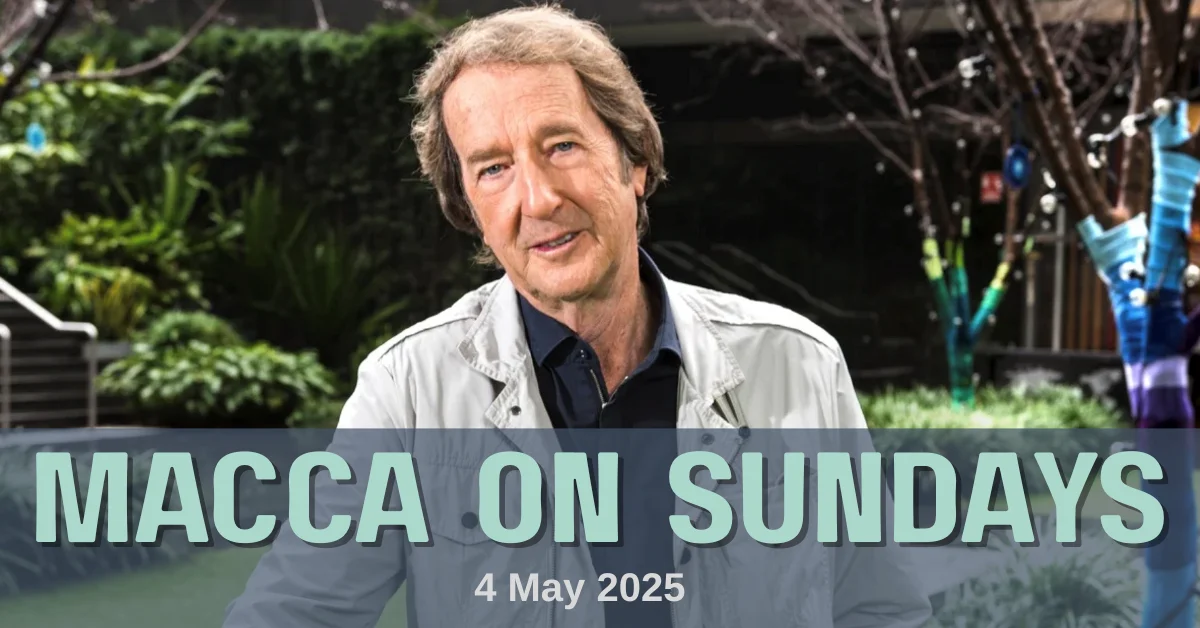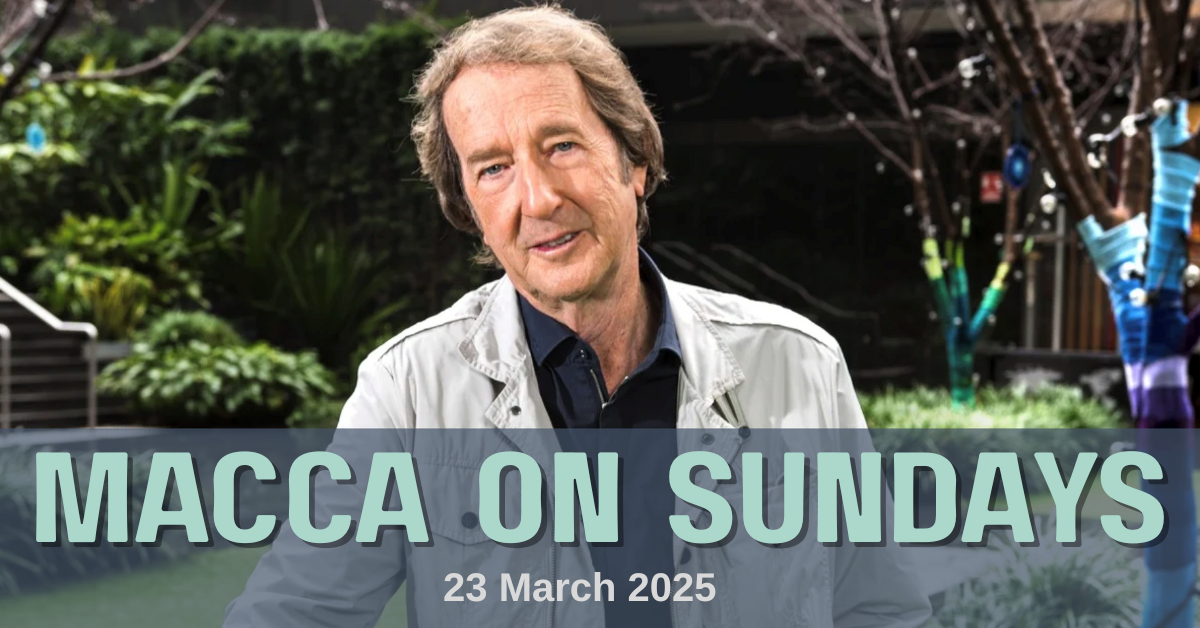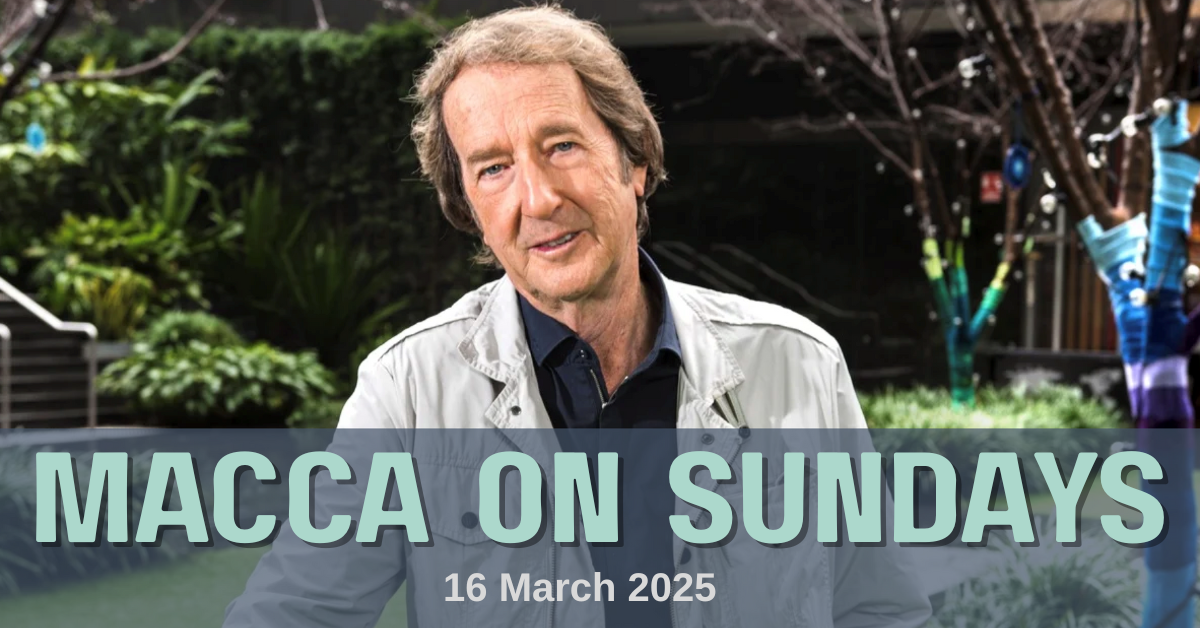
This week’s Australia All Over fell on Mother’s Day, and the program was as warm and down-to-earth as ever. Macca moved easily between hearty bush yarns and heartfelt tributes, creating a Sunday mosaic of life around the nation. From cattle musters under the outback sun to a surprise call from an Aussie truckie on a U.S. highway – and even an in-studio serenade by a beloved children’s entertainer – the show delivered a rich tapestry of Australian voices and stories, all threaded with the day’s family spirit.
- Big muster in Cloncurry: The morning kicked off with a call from a cattleman in Cloncurry, northwest Queensland, who was in the thick of a station muster. He reported that a generous wet season had left knee-high grass across his paddocks – welcome feed for his Brahmans after years of drought. With a team of stockmen on trail bikes and a chopper buzzing overhead, they were rounding up about 800 head of cattle for the first weaner sale of the year. He chuckled that his wife was spending her Mother’s Day morning driving the ute as the makeshift “smoko truck”, delivering tea and sandwiches to the muster crew. “She’s the best bush mum there is – keeping us fed and the herd moving,” he said proudly. The call painted a classic outback scene of family teamwork, dust, and determination under the Queensland sun.
- Honey flow down south: From central Victoria, a beekeeper near Bendigo rang in with sweet news. He’s managing 150 hives in the ironbark country and described an unexpected bumper autumn honey flow this year. An unseasonably warm April kept the native wildflowers blooming, so his bees packed away a late crop of dark, rich honey. “The red gum nectar came in thick – dark and caramel-like, with a hint of eucalyptus,” he said, clearly pleased. Now, with chilly nights creeping in, he’s prepping the hives for winter – insulating boxes and moving them out of frost hollows. The beekeeper noted the first light frost silvered his paddocks last week, which is the cue for him to curtail hive inspections. “Bees get cranky when the frost hits, like clockwork,” he laughed. His call blended practical bush know-how (like wrapping hives in itsy-bitsy woollen blankets, Macca joked) with a real pride in living off nature’s rhythms.
- Hello from the USA: In a memorable mid-show surprise, a call came all the way from the United States. An Aussie long-haul truck driver named Colin – originally from Toowoomba – phoned in from a truck stop on Route 66 in Oklahoma. It was early evening there, and Colin had pulled over his 18-wheeler “just to say g’day on Mother’s Day” back home. He painted a vivid picture of trucking American-style: endless interstate highways, big rigs with sleepers “the size of a Sydney studio apartment,” and roadside diners serving chicken-fried steak instead of meat pies. He joked about driving on the “wrong” side of the road at 110 km/h through the prairies (“you get used to it, but I still reach for the blinker with the wrong hand”). Colin also shared that he streams ABC online to stave off homesickness on his 10-hour drives. “Hearing Macca and the callers, it’s like I’ve got a bit of Australia in the cab with me,” he said. Before signing off, he gave a shout-out to his mum back in Queensland, promising he’d video-call her that night. The call captured the program’s all-over reach – even from half a world away, an Aussie voice found its way home to Macca on Sunday morning.
- In-studio with Don Spencer: Midway through the show, Macca welcomed a special guest into the studio – Don Spencer OAM, the famed singer-songwriter and children’s entertainer (and a familiar friend to generations of Play School kids). At 86, Don’s energy and love of music are undimmed. He chatted with Macca about his lifelong mission to bring music into kids’ lives, especially through the Australian Children’s Music Foundation he founded. Don reminisced about the early days – from growing up on a farm learning bush ballads, to strumming his guitar on Play School in the 1960s. With a gentle laugh, he recounted how a song about a kangaroo got him his first big break (“I figured if I sang about joeys and billabongs, kids would listen – and they did!”). Don even treated listeners to a few lines of his new song “Hold On To Your Dream,” a tender tune encouraging young Aussies to persevere in tough times. He picked up Macca’s studio guitar and, in a warm, slightly gravelly voice, sang a chorus that had toes tapping across the country. By the end of his segment, Don had shared both music and memories – including a touching tribute to his own mum, who bought him his very first guitar decades ago. The live studio chat added a lovely dash of nostalgia and inspiration to the morning’s parade of callers.
- Camel trouble in the Territory: From the Northern Territory came a call that had everyone listening in amazement (and a few chuckling). A station owner outside Alice Springs rang up to report an invasion of sorts – by camels. After good rains in the outback, a mob of feral camels had roamed onto his property, drawn by the only permanent water for miles. “I woke up to find about 20 camels crowding our bore drain like it was a desert oasis,” he said. The caller described the scene: gangly silhouettes emerging from dawn mist, jostling with his cattle at the trough. It wasn’t all harmless either – the hefty creatures had knocked down a fence or two and guzzled precious water meant for livestock. In true Territory fashion, he and a neighboring stockman hopped in the ute and shooed the camels off with a lot of horn-honking (and maybe a well-aimed skyward shotgun blast or two). “They run in slow motion, mate – it’s like a weird dream seeing camels gallop off into the scrub,” he laughed. The station owner noted that feral camels have been on the move with the season’s growth, sometimes causing havoc for pastoralists. His yarn was equal parts comedy and bush reality, and as Macca quipped, “only in Australia would a Sunday morning chat about camel traffic jams make perfect sense.”
- A Mother’s Day poem on air: Fittingly, the program’s most tender moment came toward the end, thanks to an 87-year-old bush poet from the NSW Riverina. Phyllis from Griffith phoned in to share a short poem she’d written as a tribute to mothers in the bush. In a steady, lilting voice, she recited verses that took listeners back in time: morning dew on the wheat, a mother’s hands lighting the wood stove, children’s laughter echoing in a one-room schoolhouse. Her poem honored the quiet, relentless work of country mums – “the tea-and-toast queens of the outback, holding the family together.” One line that lingered in the air was, “She fed the poddy lamb at dawn, then fed her family at dusk – a day’s work never done, powered by a mother’s love.” As she finished, Phyllis wished all the mums listening a happy Mother’s Day, adding with a chuckle, “Don’t forget to give Mum a call, okay?” The studio fell silent for a moment – even Macca was clearly moved – before he thanked her for a beautiful contribution.
Other calls included:
- A fun run in full swing: A quick check-in from Melbourne revealed thousands of pink-clad participants flooding the parks for the annual Mother’s Day Classic fun run. The event organizer breathlessly reported a record turnout at sunrise – runners and walkers honoring loved ones and raising funds for breast cancer research. “There’s a sea of pink tutus and big smiles here, Macca!” she shouted over the cheerful hubbub.
- First frost down south: A weather watcher in Liawenee, Tasmania (one of the coldest spots in the country) called to confirm that winter is knocking. He measured a pre-dawn low of -1°C, leaving a glitter of frost over the paddocks. “Brass monkeys, mate – the dog’s water bowl was iced over,” he laughed, noting that the wood heater was cranked up and keeping the shack cosy for his wife on Mother’s Day.
- Tuna tales from SA: A fisherman from Port Lincoln, SA gave a brief update on the tuna season offshore. It’s been a ripper season for Southern Bluefin – he himself landed a 75-kg tuna last week. He joked that since he couldn’t be with his mum in Adelaide that day, he sent her a photo of the massive fish and promised her some prime fillets. “That’s one way to do Mother’s Day brekkie – tuna steaks on the barbie!” he quipped, signing off with a laugh.
Listen to the podcast episode here.
Disclaimer: Brisbane Suburbs Online News has no affiliation with Ian McNamara or the “Australia All Over Show.” This weekly review is an attempt to share the wonderful stories that Ian broadcasts each week and add value to what is a smorgasbord of great insights.






